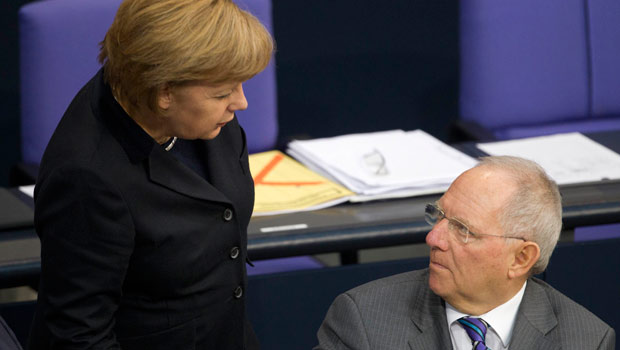A day after weak demand for a German bond auction raised concern the crisis may be spreading to Europe’s economic powerhouse, the closely-watched Ifo business climate index bucked expectations to rise for the first time since June.
The Munich-based Ifo think tank’s business climate index, based on a monthly survey of 7,000 companies, edged up to 106.6 in November from 106.4 in October. The median forecast in a Reuters poll of 43 economists had been for a drop to 105.1.
The news pushed up the euro and European shares, providing some relief after Wednesday’s poor Bund auction when the German debt agency could not find buyers for almost half a 6 billion euro bond sale. Analysts called the auction of 10-year bonds a “disaster.”
Ifo economist Klaus Abberger told Reuters that the November index showed the debt crisis had not yet reached Germany’s real economy and that the country had good chances of avoiding recession this winter, with domestic demand looking stable.
“A slowdown will come but not a drastic one. We are not in free-fall,” Abberger said.
The firms surveyed by Ifo reported stable current business conditions while their expectations improved slightly.
“The German economy will not be able to escape these general recessionary tendencies (in the euro zone),” said ING economist Carsten Brzeski. “However, today’s Ifo index shows that if policymakers get a grip on the crisis management, Germany could get off more lightly than most other countries.”
Earlier on Thursday Germany confirmed that gross domestic product growth accelerated in the third quarter, with private consumption growing at its strongest pace in more than a year.
German retailer Douglas, which sells perfumes, cosmetics and books making it very focused on Christmas sales, said last week it was “seeing no signs the mood of the consumers has been dampened by the euro zone crisis.”
“In fact, they seem in the mood to shop,” Douglas Chief Executive Henning Kreke told Reuters.
GDP growth accelerated to 0.5 percent in Q3 while private consumption swung back to growth of 0.8 percent after shrinking in the previous quarter, and investment in plant equipment rose 2.9 percent. On an annual basis, however, growth eased again.
Timo Klein of His Global Insight has pencilled in average GDP growth dropping to 0.8 percent next year from an estimated 3 percent for 2011 and said euro-crisis risks “continue to bias any future forecast revisions to the downside for now.”
Germany recovered swiftly from the 2008/09 financial crisis, with its growth outstripping all others in the single currency zone, but there are clear signs the economy is now shifting down a gear.
German industrial orders saw their steepest decline in September since early 2009, weighed down by sharply weaker demand from the euro zone. Industrial production has already begun to feel the pinch, falling 2.7 percent in September.
Economists, the government and the Bundesbank have all cut their German growth forecasts in recent weeks. The government now forecasts growth of 1 percent in 2012, down from an earlier estimate of 1.8 percent.










